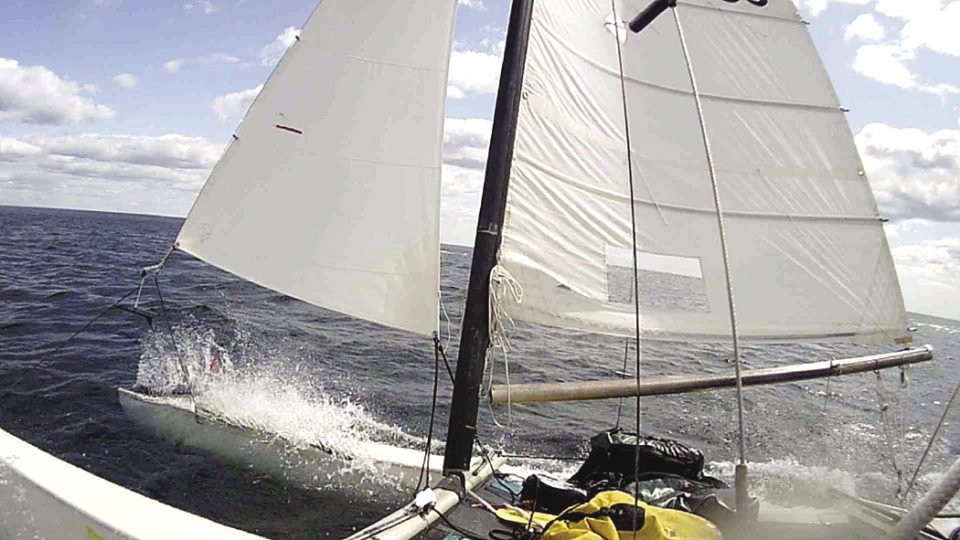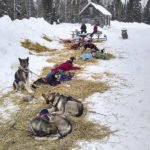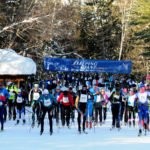Last August, a group of four friends set out to circumnavigate Lake Superior. The basic ingredients of this story are familiar to anyone who lives near the lake—adventurous souls who want to test their mettle, a deep love of the lake, and vessels to carry them (feet, car, bike, motorcycle, kayak, sailboat, stand-up paddleboard, etc.). But, no two trips will ever be quite the same.
Blue sky, brisk winds, and excited friends gave Brontë Goodspeed Gross, Sarah Szymaniak, Alec Malenfant and Clair Emmons a brilliant send-off from Bayfield on August 17, 2019, only two days later than their original targeted departure date. But what are two days when you’ve been dreaming of a trip for three years, and planning it for 12 months?
Brontë—who grew up sailing in the Apostle Islands—hatched the plan as an easier alternative to opening up a kayaking business with Alec.
“It was kind of a joke at first,” Brontë told me, “but then it became a heavy weight in my life, and soon it began pulling all sorts of ideas and decisions around itself into a whirlpool at the bottom.”
Brontë’s girlfriend, Sarah, continued, “Eventually we started buying boats and making plans and creating menus and all of a sudden we were out there. Many things changed about the trip during the planning process, but the dream to connect with the lake in a very close and personal way always stayed the same.”
So, as the noon bell clanged in Bayfield harbor, the crew of four friends set sail in two 18-foot Sol Cat catamarans. The boats—Lunacy and Sundog—were both built in the mid-to-late 1970s, and were therefore older than their crew of recent Northland College graduates. The day was warm and beautiful, the Apostle Islands gorgeous, and they watched an amazing sunset before pulling into a beach near Cornucopia at 8:45 p.m.
“It was the latest we ever pulled into port,” emphasized Brontë, “and we were very tired.” “VERY” tired reiterated Sarah. “Don’t you think we should tie the boats up?” she’d asked Brontë. “Oh no, we’ll just be hyper aware,” had been Brontë’s response. Their banter—now several months later—was dripping with the humor and sarcasm that comes from having learned from your mistakes.
After that late night, the crew woke up to find that Sundog, the younger of the two catamarans and the one they’d dubbed a troublemaker, was missing. It had been blown offshore by an early morning thunderstorm. Donning drysuits as raingear, the sailors scoured the coastline for over an hour as the storm raged and then passed. You can imagine their devastation. To have put all of that money, time, and excitement into the planning, to have a support crew cheering for you at home, and then to have the trip fall apart on the morning of the second day was unthinkable.
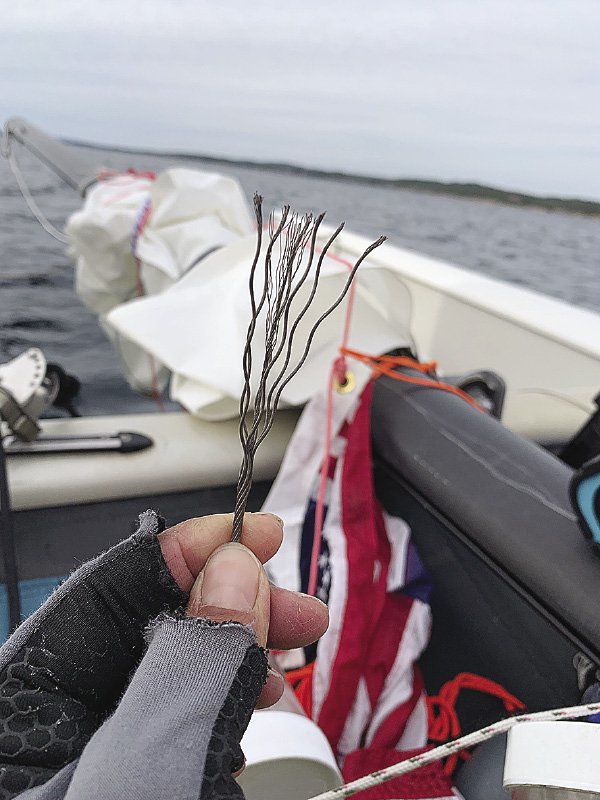
Reluctantly, Brontë called the Coast Guard to report the missing vessel. They typically send help only if life is on the line, but somehow, compassion, good humor, and schedules aligned. The Coast Guard decided to incorporate finding the lost vessel into a training exercise. “It’s like the National Guard helping to find your lost dog,” Brontë explained. The Coast Guard discovered Sundog floating 7 miles to the east, with all the loose gear Brontë and Alec had left strewn about the deck still intact.
Elated that their momentary lapse in judgement had turned out OK, the friends continued on their journey—perhaps a little wiser and more meticulous. “We are relaxed, easygoing people,” admitted Brontë, “but we took this responsibility very seriously. Our ultimate goal was never to get around the lake, it was to come back home. We made all kinds of mistakes (“all kinds!” piped in Sarah), had accidents (“lots!”) and had some foolishness on our part, but by and large we never lost sight of the goal to come back home.”
The wind and weather were perfect as they sailed briskly north. Sarah, who is relatively new to sailing, was finally feeling confident as she leaned out over the side of the boat attached to the mast by a harness and wire. “Trapezing” as they called it, is a way to manage yourself as a counterweight and help stabilize the catamaran. Alec steered her boat. Brontë and Clair sailed Sundog. As the fleet sped along at 13.6 knots (over 15 mph), the bow of one pontoon dipped deeper and deeper into the waves. “We were having so much fun!” exclaimed Sarah.
And then Sarah and Alec were in the 35ºF water, capsized and scared. With Brontë’s help, Sarah and Alec righted Lunacy and sailed into the harbor at Tofte—many miles short of their goal. “It took me the rest of the trip to get my confidence back,” admitted Sarah, with less humor and sarcasm in her voice than before.
Sarah and Alec had discovered the hard way that the connection between the deck and the hull on their four-decade-old craft would loosen and flex in big waves, and allow water to slowly fill the hull. Once aware of this problem, the crew began to regularly check and empty water from the pontoons.
Boat maintenance in general was a significant part of the daily flow. For instance, they started allowing for an extra hour each morning to ensure that their 3.6 horsepower Mercury motor, aptly named Mercy, was working properly. She helped them make headway when the winds were down.
Winds on Lake Superior are rarely calm, though. Rough weather kept the crew in Grand Marais for a week longer than their scheduled duff day. Those extra days of creature comforts loosened some of the crew’s commitment to the expedition and threatened to derail the trip and the expedition mindset. “That was one of our blackest moments,” remembered Brontë. “Most of us were wondering why we were even on the trip.”
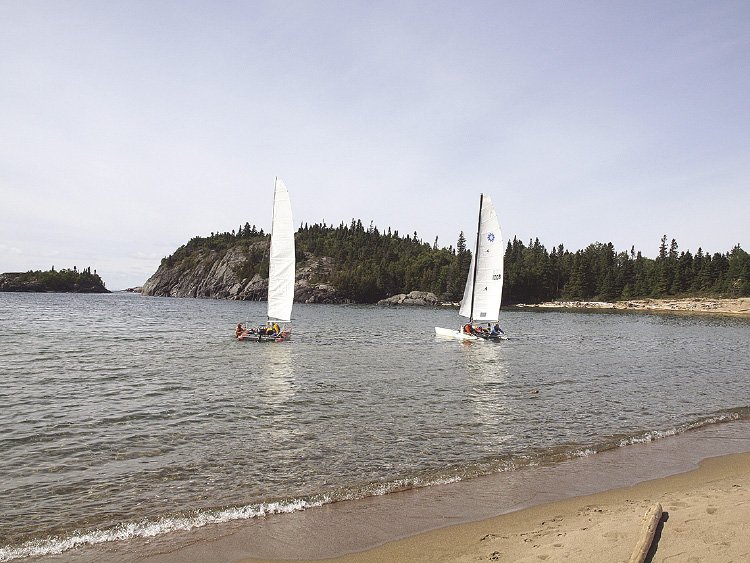
The sailors pushed on, though, and a brisk wind soon blew them toward Canada. As the shoreline rose steeply, so did their spirits. “The wind was perfect, the sun warm, and we were having a great time,” remembers Brontë. “I can’t imagine a more gorgeous place than the Susie Islands.”
Then Sundog’s rudder fell off. They did mention doing lots of repairs…
Labor Day weekend found them on Thompson Island near Thunder Bay, listening to saxophone music and being gifted with salad and pie. For the next five days, they sauna-hopped on remote islands and even visited a bathtub on a beach. With just a few days left in the adventure, Sarah was finally getting her confidence back after the earlier capsize. They were ready for the most remote stretch of the trip—100 miles from Hattie’s Cove in Pukaskwa National Park to their end point near Wawa, with no roads or access points between.
Off the coast of Michipicoten Island—the most inaccessible point on their journey so far—the mast on Lunacy came crashing down in the strong headwind. No one was hurt, but plans had to change. They lashed the boats together and sailed back downwind to Hattie’s Cove. Sarah’s dad, who had been driving their support van, met them at the landing with boat trailers. The vacation time they’d requested from various jobs had run out, and it was time to return home.
“Why do people enjoy expeditions?” philosophized Clair. “You’re uncomfortable constantly. But time spent in beautiful natural places allows us to gain new perspectives. And also, as we push ourselves to try something new, whether the experience is good or bad, it teaches us something. We change and grow.”
Of course, the crew is already trying to figure out how to complete their circle. The basic storyline will still be familiar—adventurous souls who want to test their mettle, a deep love of the lake, and vessels to carry them—but after so much growth and change, not even the characters themselves will be the same.


